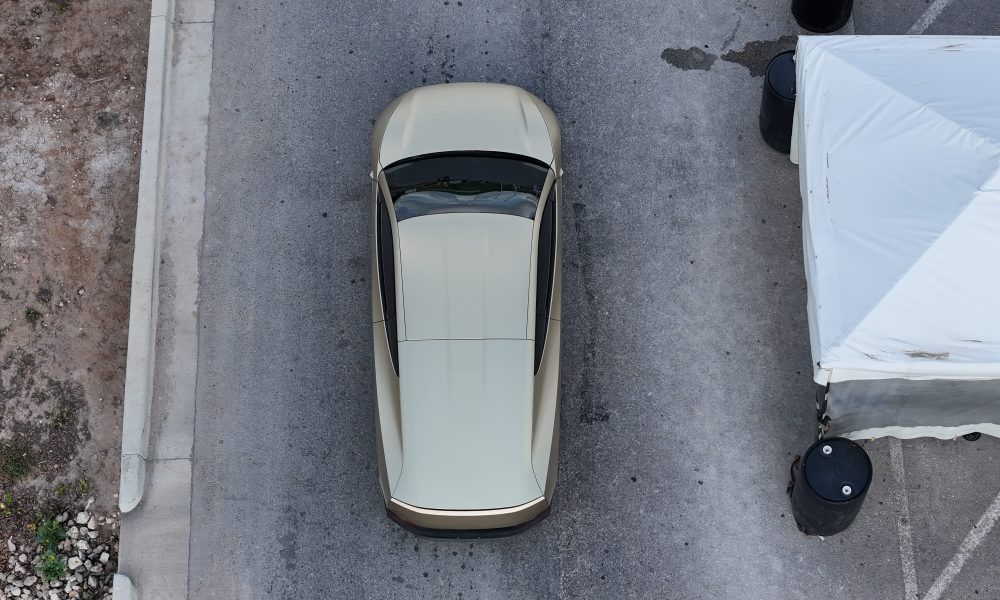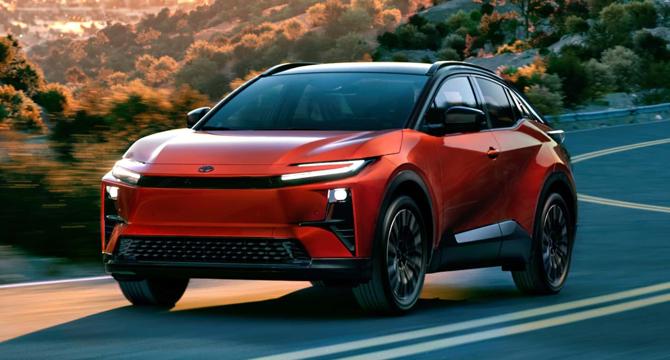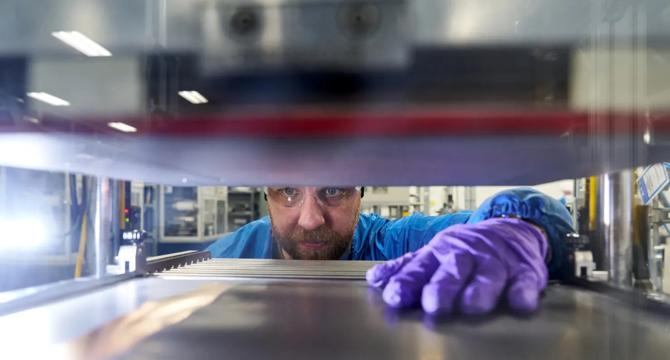Electric Vehicles News
Chargedevs
223

SolarEdge launches new solar-powered EV charging solution for fleets
- SolarEdge has launched a new EV charging system as part of its commercial-scale solar and storage solutions.
- The system includes an EV charger powered by an energy management system acquired from Wevo Energy.
- The new charger is designed for fast installation and can dynamically adjust charging power based on real-time energy loads.
- SolarEdge's energy management system optimizes the use of excess solar energy and prioritizes charging modes to reduce costs for businesses.
Read Full Article
13 Likes
Teslarati
30

Image Credit: Teslarati
Tesla Cybertruck police vehicles escort Trump motorcade in Qatar
- Two Tesla Cybertruck police vehicles accompanied President Donald Trump's motorcade in Doha, Qatar.
- Qatar provided an elaborate reception for Trump, including a unique police escort with Tesla Cybertrucks.
- Qatar seems to have a preference for the Cybertruck, as it was previously reported to be used in the country's Internal Security Force.
- Tesla CEO Elon Musk expressed excitement about seeing Cybertrucks being utilized in Qatar during Trump's visit.
Read Full Article
1 Like
Insideevs
96

Image Credit: Insideevs
General Motors Overtakes Tesla In China EV Sales
- General Motors has surpassed Tesla in electric vehicle (EV) sales in China, with a larger market share as well.
- Tesla's market share in China dropped to 3.2% in April, while GM accounted for 6.3% of China's new energy vehicle (NEV) market.
- GM's success in China is attributed to various models like Buick's Electra sub-brand, Cadillac Lyriq, and Wuling Hong Guang MiniEV.
- Tesla is facing sales declines in the U.S. and Europe, with concerns about weak demand and production challenges like the Model Y ramp-up.
- Tesla has resumed importing Chinese parts for its Cybercab and Semi, following a temporary trade tensions truce between the U.S. and China.
- BMW aims to expand its EV line-up by 2030, with plans to have at least one EV in every segment it competes in.
- BMW's transition to EVs is progressing smoothly, with a strong focus on introducing competitive models and preparing for software-defined vehicle launches.
- GM, traditionally known for gas trucks, now has over 10 EV models in the U.S. market and is positioning itself as a significant player in the EV space.
- Tesla is exploring new ventures like robotaxis and humanoid robots as its core passenger vehicle business faces challenges.
- GM's success in China's EV market showcases how automakers are embracing electric vehicle technology and competing with established brands like Tesla.
Read Full Article
5 Likes
Teslarati
48

Image Credit: Teslarati
Elon Musk teases underrated Cybercab and Optimus business
- Elon Musk responded positively to an underrated business idea involving the Cybercab and Optimus.
- The idea involves using the inactive Cybercab fleet at night for autonomous deliveries with the help of Optimus humanoid robots.
- The design of the Cybercab with a large trunk makes it suitable for a parcel delivery business, complemented by mass production of the Optimus robots.
- This potential dual-use of the Cybercab and Optimus could expand Tesla's business horizons beyond autonomous robotaxi services.
Read Full Article
2 Likes
Insideevs
219

Image Credit: Insideevs
MAN’s First Electric Coach Has An Enormous Battery Pack
- MAN has launched the first major European battery electric Coach with a capacity of up to 536 kWh and a claimed driving range of 403 miles.
- The eCoach can charge at up to 375 kW and may reach 750 kW once the charging infrastructure is ready.
- The MAN Lion’s Coach E features a sizable battery pack, capable of accommodating 356 to 536 kilowatt-hours, and is expected to be unveiled in October with production starting next year.
- The all-electric coach will initially be a three-axle vehicle with a maximum weight of 54,600 pounds, accommodating up to 61 passengers and their luggage.
Read Full Article
13 Likes
TechDigest
232

Image Credit: TechDigest
Skoda expands EV range with new Enyaq vRS models from £51,000
- Škoda Auto introduces two new high-performance vRS versions of its Enyaq models, the Enyaq vRS and Enyaq Coupé vRS, offering a dual-motor, all-wheel-drive system with 340 PS for fast acceleration.
- The Enyaq vRS models feature an 84 kWh battery with over 340 miles of range, support DC fast charging at up to 185 kW, and come equipped with advanced technology and assistance systems.
- Design and styling emphasize sportiness, with high-gloss black accents, exclusive alloy wheels, a sport chassis, and two interior design selections.
- Order books for the Enyaq vRS models open on June 12th, with starting prices of £51,660 for the Enyaq vRS and £53,560 for the Enyaq Coupé vRS.
Read Full Article
14 Likes
Design-Milk
171

Image Credit: Design-Milk
The Slate EV Is Totally Customizable and Could Cost Just $20,000
- Slate, a new startup, introduces an affordable and customizable electric vehicle starting at $20,000 with federal tax credits.
- The Slate EV offers three body styles and emphasizes customization, targeting urban and first-time EV owners.
- Buyers can customize exterior elements and interior features, including the option to use their own speaker system.
- The vehicle focuses on practicality, cost savings, and simplicity in design, aiming to make EVs more approachable and affordable in the market.
Read Full Article
10 Likes
Insider
162
Image Credit: Insider
Rivian and VW's new $22,500 car proves cheap EVs don't have to be low-tech, the Tesla rival's software boss says
- Rivian and Volkswagen have collaborated to develop the $22,500 ID.EVERY1, VW's most affordable electric car, incorporating high-tech features.
- The partnership aims to bring advanced technology to budget-friendly EVs, with the ID.EVERY1 set for release in Europe by 2027.
- The collaboration involves a joint venture focusing on software and EV technology, enabling cost savings and enhanced user experience through centralized computer control.
- Other competitors in the EV market, like Slate Auto, are also introducing affordable electric vehicles, with varying approaches to tech integration and pricing strategies.
Read Full Article
9 Likes
Evannex
26

Image Credit: Evannex
Why Killing EV Tax Credits Hurts Drivers More Than Automakers
- Republican lawmakers in the U.S. proposed ending the $7,500 federal tax credit for new EVs and $4,000 credit for used EVs, affecting the EV ecosystem.
- Impact on battery affordability, EV resale value, aftermarket upgrades, U.S.-based EV jobs, and tech innovation if tax credits are removed.
- Current incentives include up to $7,500 off new EV purchases, $4,000 off used EVs, local rebates, and home charging equipment incentives.
- Suggested actions include upgrading home charging, planning road trips with essential accessories, and preserving EV resale value before potential policy changes.
Read Full Article
1 Like
TechDigest
320

Image Credit: TechDigest
Audi expands EV line up with new £88,000 e-tron GT quattro
- Audi has introduced the new entry-level e-tron GT quattro to their electric vehicle lineup, now available for order in the UK with deliveries beginning in August.
- The e-tron GT quattro features impressive performance, offering 584PS peak output with Launch Control, a 0-62mph acceleration in 4.0 seconds, and up to 384 miles of range on a full charge.
- Key technological features include a 320kW charging capacity allowing approximately 177 miles of range to be added in just 10 minutes, along with the e-tron route planner for optimal charging performance.
- Pricing for the e-tron GT quattro starts at £88,555 (OTR), and an enhanced Vorsprung edition is available from £108,055 (OTR), offering additional features like all-wheel steering, head-up display, Fine Nappa Leather upholstery, and a Bang & Olufsen 3D Premium Sound System.
Read Full Article
19 Likes
Insideevs
347

Image Credit: Insideevs
The 2026 Toyota C-HR Wants To Be A Sporty bZ
- The Toyota C-HR returns for 2026 as an EV-only crossover, sharing mechanical bits with the Toyota bZ, available only in all-wheel-drive with 338 horsepower and up to 290 miles of range.
- The C-HR makes a comeback with a sportier appeal, being the electric version of the Toyota bZ crossover, riding on the e-TNGA platform with AWD and 338 horsepower, featuring unique dynamic changes compared to its bZ sibling.
- The C-HR comes equipped with a NACS port, plug and charge capability, Tesla-style features for fast charging, and boasts similar interior qualities as the bZ, with ample cabin space and 25.4 cubic feet of cargo room behind the rear seats.
- In contrast to other markets, the C-HR in the US will only be available in AWD with a 74.7 kWh battery, offering a compelling option for those seeking an electric crossover with driving verve, set to arrive in dealerships next year.
Read Full Article
20 Likes
Guardian
298
Image Credit: Guardian
The Cybertruck was supposed to be apocalypse-proof. Can it even survive a trip to the grocery store?
- The Cybertruck, introduced in 2019, was envisioned as an apocalypse-proof vehicle complete with an ultra-hard steel exoskeleton and bulletproof features, but it has faced criticism and doubts over its practicality and functionality.
- The design of the Cybertruck diverges from traditional truck models, offering a wedge-shaped silhouette inspired by cyberpunk aesthetics and Blade Runner, while mocking conventional truck layouts.
- Despite initial hype and over 2 million preorders, the Cybertruck's delayed release and increased pricing led to diminished enthusiasm among consumers, especially as its utility and durability came into question.
- Critics point out concerns such as the Cybertruck's aluminum underbody being less sturdy, potential rust issues with stainless steel, and its 300-mile range posing challenges in dire situations where recharging infrastructure may be scarce.
- Issues with maneuverability, safety risks, and robustness in extreme conditions further highlight doubts surrounding the Cybertruck's suitability as a post-apocalyptic vehicle, especially compared to more traditional and reliable truck models.
- The truck's controversial design, political associations, and safety incidents have contributed to its reputation as a divisive and meme-worthy symbol, contrasting with its initial portrayal as a cutting-edge and futuristic mode of transportation.
- Concerns about cybersecurity vulnerabilities, lack of repair accessibility in critical scenarios, and the Cybertruck's distinctive and conspicuous profile raise additional doubts about its practicality and adaptability in survival or disaster scenarios.
- As Tesla faces challenges and competitors gain traction in the EV pickup market, the Cybertruck's future sales and viability remain uncertain, with critics highlighting its potential downfall due to ambitious claims and a divergence from consumer expectations.
- The fate of the Cybertruck serves as a cautionary tale of the risks of overhyped technology and the importance of practicality and functionality in vehicles designed for survival scenarios or everyday use.
Read Full Article
17 Likes
The Verge
408

Image Credit: The Verge
Toyota confirms the all-electric compact C-HR is coming to the US
- Toyota will be bringing the previously Europe-only all-electric C-HR compact crossover to the US next year.
- The US version will have a single battery option with 77 kWh capacity, providing an estimated range of up to 290 miles.
- Toyota plans to offer a variety of powertrain options for the C-HR in the US, including hybrid, plug-in hybrid, and hydrogen fuel cell.
- The compact EV will feature 338 horsepower, 0-60 mph time of five seconds, and various modern features like North American Charging Standard port and Plug and Charge capability.
Read Full Article
24 Likes
Silicon
153

Image Credit: Silicon
General Motors Touts ‘Groundbreaking’ Lower-Cost EV Batteries
- General Motors plans to use lower-cost battery technology in its electric SUVs and trucks in 2028, utilizing lithium manganese-rich chemistry for increased profitability.
- The new batteries will use more prevalent and less expensive minerals like manganese, reducing the reliance on scarcer cobalt and nickel.
- GM's partnership with LG Energy Solution aims to produce batteries offering over 400 miles of range for electric trucks while significantly cutting costs.
- The company has achieved cost reductions and plans to introduce prismatic LMR batteries alongside existing pouch cell batteries and upcoming lithium iron phosphate cells.
Read Full Article
9 Likes
For uninterrupted reading, download the app